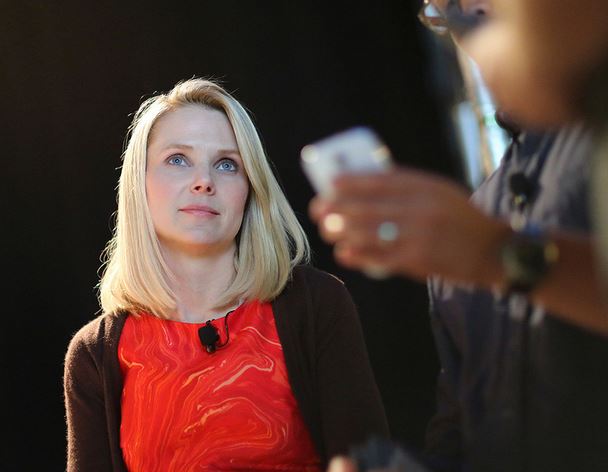5 Types of Masked Sexism You've Probably Already Experienced

By:
Ellen Pao made headlines earlier this year for losing her lawsuit against former employer Kleiner Perkins Caulfield & Bryers, accusing the company of workplace sexism. Pao said she experienced subtle sexism at the office after reporting unwanted sexual advances to her supervisor. This started a larger conversation about soft sexism, which is a more discreet but equally harmful form of gender discrimination.
Soft sexism can be hard to pinpoint, but many young women experience it at work. Here are some examples of soft sexism.
RELATED: THE SEXISM NO ONE REALLY TALKS ABOUT
1. Excluding female coworkers from events.
 Christopher Michel/Flickr - flickr.com
Christopher Michel/Flickr - flickr.com
In a recent piece for Lena Dunham and Jenni Konner's newsletter Lenny, Pao talks about the boys club nature of working in law. According to a 2014 report from the American Bar Assocation's Commission on Women in the Profession, the field is male-dominated with 66 percent of men and just 34 percent of women working in the legal profession. Pao felt this gap as an attorney.
She wrote:
"When one of the women lawyers at my law firm was sent home for wearing pants, many of us made a point to wear pants more often. All major law firms seemed to be organizing all-male events: steak dinners, professional sports games, strip-club outings, and probably more. We didn't complain about it, because it seemed an unchangeable part of law."
Pao said she and her female colleagues started organizing their own coed dinners and working even harder as a result, but being left out was a challenge nonetheless. In Pao's lawsuit, she mentioned that a group of her male colleagues had also set up a skiing trip that excluded women. While excluding women might not seem like something to get upset about, it doesn't promote good morale in the workplace or send a message of professional support to female workers.
ALSO: AMY SCHUMER TACKLES HOLLYWOOD SEXISM
2. Criticizing women for standing up for themselves and straying from likability.
 Flickr/Gage Skidmore - flic.kr
Flickr/Gage Skidmore - flic.kr
During performance reviews at Kleiner Perkins Caulfield & Bryers, Pao was critiqued for having "sharp elbows," and while other men received similar feedback for seeming tough, they were promoted while she was not. This is an example of men and women being treated differently for behaving in a similar manner. Men may be praised for acting strong-willed in the workplace, but women can face backlash for doing the same thing and throwing the concept of likability out the window.
Academy Award-winning actress Jennifer Lawrence revealed she has faced challenges sticking up for herself at work in a recent essay for Lenny as well. Lawrence divulged a recent incident in which a male coworker seemed to be taken aback when she shared her opinion in a straight-forward way, a reaction that surprised her because she was merely speaking her mind:
"A few weeks ago at work, I spoke my mind and gave my opinion in a clear and no-bullshit way; no aggression, just blunt. The man I was working with (actually, he was working for me) said, 'Whoa! We’re all on the same team here!' As if I was yelling at him. I was so shocked because nothing that I said was personal, offensive, or, to be honest, wrong. All I hear and see all day are men speaking their opinions, and I give mine in the same exact manner, and you would have thought I had said something offensive."
That's why she no longer gets hung up on speaking up in a nice manner. She wrote:
"I’m over trying to find the 'adorable' way to state my opinion and still be likable! Fuck that. I don’t think I’ve ever worked for a man in charge who spent time contemplating what angle he should use to have his voice heard."
ALSO: WHY AREN'T THERE MORE WOMEN IN STEM?
3. Fixating on a woman's appearance.

Many successful women weather comments about their appearance at some point in their careers. Nicholas Carlson's book about Yahoo! extensively covers CEO Marissa Mayer's appearance, which, of course, is irrelevant to the work she does running the company. The book details an all-hands meeting in which Mayer appeared different than she had for a magazine shoot.
"That Thursday in November, Mayer looked like a different person," he wrote. "She looked agitated. Nervous. Her hair was wet. She wore no makeup."
ALSO: THIS CARTOON NAILS THE PROBLEM WITH RESTAURANT SEXISM
Her wet hair comes up a second time in the book as well.
"Mayer explicitly rejects feminism— and she has shown up to the most important meetings of her life with wet hair and no makeup on," he wrote.
Mayer isn't the only powerful woman to face petty comments about her appearance when making big career moves. Several years ago, gymnastic champion Gabby Douglas received a lot of criticism on social media for her "unkempt" ponytail while competing in the Olympics.
"Are you kidding me?" she told USA Today at the time. "I just made history. And you're focusing on my hair? I just want to say, we're all beautiful inside out. I don't think people should be worried about that. Nothing is going to change."
4. Asking women about their pets/family life and men about their work.
After Pao lost her lawsuit earlier this year, New York Magazine writer Annie Lowrey wrote a story about the soft sexism she's faced in conversation at D.C. social events.
"Cocktail Party Guy asks my husband [Vox editor-in-chief Ezra Klein] about how things are going at his news site, and he answers. Then Cocktail Party Guy asks me how our dogs are, and I answer, before pivoting the conversation back to work — and later rolling my eyes as we walk away. It is not impolite. It is not inappropriate. But it is still, at least in my mind, sexist. Both me and my husband love our work. Both me and my husband love our dogs. One of us gets asked about our work. One of us gets asked about our dogs."
ALSO: HOW "THE SCARLET LETTER" IS HELPING GIRLS FIGHT SEXISM
5. Assuming female coworkers handle food at the office.
 dolgachov - bigstockphoto.com
dolgachov - bigstockphoto.com
When I worked as a receptionist a while back, a male coworker approached me one day and asked when I would make paninis for the office. The former receptionist was well-loved for whipping up elaborate treats for everyone at least once a week, so it was assumed that I would take on this duty as well.
Though none of my colleagues meant any harm by wanting me to cook, the expectation that I would regularly cook for them seemed odd because it had nothing to do with the job itself, and it also seemed like people wanted to me fulfill a traditional gender role simply because my predecessor had been a culinary expert. But expecting women to handle food and drink at the workplace is completely unfair if this is irrelevant to her job title.
I'm not alone in weathering this kind of soft sexism at work. Earlier this year, Jezebel asked for readers to share their own experiences with soft sexism and one reader said that she was expected to handle the coffee pot merely because her desk was placed near it:
"When I started working at my job, the coffee maker was by the copier and lots of colleagues would ask why I didn’t start a new pot of coffee since I was at the copier. I was second in command of the finance department and yet I was still expected to make coffee when someone else had clearly emptied it because I am female and within proximity of the machine. I gave the same response every time someone snarked or thought they were clever about it: 'I do not drink coffee and am not responsible for that machine. Find the person who emptied the pot and walked off.' Still took a year to stop being asked to make the coffee."
